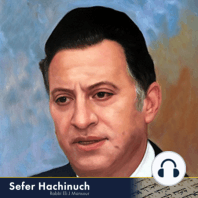20 min listen
Misva #120: The Sacrifice to Atone for the Sanhedrin’s Mistaken Ruling
FromSefer Hachinuch
ratings:
Length:
20 minutes
Released:
Jan 18, 2022
Format:
Podcast episode
Description
The Torah in Parashat Vayikra (4:13) speaks of a case where “the entire nation mistakenly sins” because “a matter was concealed from the ‘eyes’ [leaders] of the congregation.” This refers to a situation where the Sanhedrin – the highest Rabbinical court, consisting of seventy-one leading scholars – issued a mistaken ruling, permitting something which is forbidden and punishable by Karet (eternal excision from the Jewish Nation). If the majority of the nation accepts their ruling and violates the prohibition in question on the basis of this mistaken ruling, then a special atonement sacrifice must be offered, consisting of a bull, called the “Par He’alem Dabar Shel Sibur.” The Sefer Ha’hinuch explains that if the great Rabbis of the Sanhedrin issued a mistaken ruling, this reflects a deficiency in their intellect, which in turn indicates that their physical beings overpowered, if only somewhat, their intellectual faculties. An intellectual error testifies to the intellect’s having been subdued by one’s physical essence. The offering of a sacrifice symbolizes the need to subdue our animalistic, physical qualities, and to instead elevate and enhance our spiritual beings. Therefore, when the Sanhedrin errs, a special sacrifice is brought to remind them of the primacy of the Sechel (intellect) and that it must never yield to our base, physical inclinations. This obligation applies only if all seventy-one members of the Sanhedrin issued the mistaken ruling, together with the Ab Bet Din (head of the court). All seventy-one members had to have been eligible to sit on the Sanhedrin, to the exclusion of Gerim (converts), those of advanced age, and others who are disqualified from serving on the Sanhedrin. Moreover, this sacrifice is required only if the majority of the nation accepted the ruling, trusting and relying on the Sanhedrin’s wisdom and scholarship. If the people figured that the Sanhedrin issued an erroneous ruling, but they decided to nevertheless act upon the mistaken leniency, then this Misva does not apply. Furthermore, this obligation applies only if the Sanhedrin mistakenly concluded that something was permissible, but not if they denied the prohibition in question. For example, if the Sanhedrin determined that Heleb – animal fat which the Torah strictly forbids – is actually permissible for consumption, then the sacrifice is not offered. The sacrifice is required only if the Sanhedrin wrongly determined that a certain part of the animal is not included in the Heleb prohibition, when it in fact is considered Heleb and forbidden. This command applies only if Bet Din is aware of the precise ruling which they issued and which turned out to be mistaken. If they acknowledge in a general sense that they had made a mistake, this sacrifice is not offered; they must be able to specify to the particular error that was made. In a case requiring a “Par He’alem Dabar Shel Sibur,” each of the twelve tribes must offer this sacrifice. If the mistaken ruling permitted a certain action which in fact constitutes forbidden idol worship, then in addition to this sacrifice, each tribe must also offer a goat to atone for mistakenly violating the prohibition against foreign worship. This Misva applied only when the Sanhedrin convened in its office in the Lishkat Ha’gazit – the special chamber in the courtyard of the Bet Ha’mikdash designated for the Sanhedrin. Forty years before the destruction of the second Bet Ha’mikdash, the Sanhedrin was exiled from the Lishkat Ha’gazit, and ever since that time, this Misva has not applied.
Released:
Jan 18, 2022
Format:
Podcast episode
Titles in the series (100)
Misva #8: Leaving Over Meat of the Korban Pesach: Daily Sefer Hachinuch - Brought to you by itorah.com by Sefer Hachinuch
